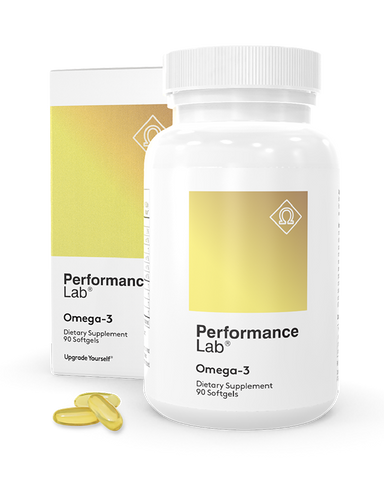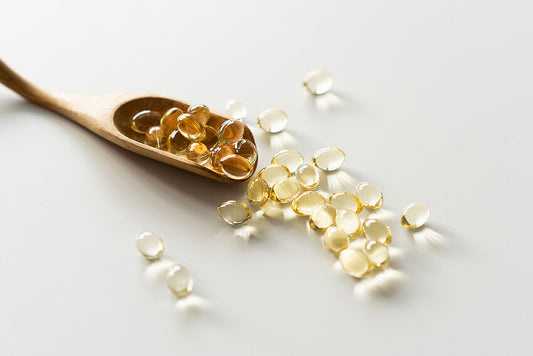Fish oil and omega-3s are words often thrown around in the world of health. This is because they provide numerous benefits to our health and are an essential part of a well-balanced diet.
However, there is often a lot of confusion about the differences between fish oil supplements and omega-3s because there is some overlap.
To help clear up the confusion, we will explain the key differences between the two and why we need omega-3s in the first place. Plus, find out how much you should be consuming and how to choose the best supplement.
Are Fish Oil and Omega-3s The Same?
To put it simply, fish oil supplements provide a type of fat called omega-3s, but omega-3 supplements are not necessarily derived from fish oil.
There are three types of omega-3 fatty acids that the body requires to carry out a number of important functions and for good health (more on this later). These include EPA and DHA, derived primarily from oily fish, such as tuna, salmon, mackerel, and sardines, as well as meat, dairy, eggs, and algae.
Another essential omega-3 is ALA, which comes from plant sources such as seeds and nuts. ALA is not found in fish oil.
What Are Omega-3 Fatty Acids?
Omega-3 fatty acids are a type of polyunsaturated fat that are an essential part of our diet. Eating fats is often considered unhealthy when in fact, certain fats, such as omega-3s, are crucial for a healthy brain and body 1.
They form the structure of every cell wall, provide energy, and are involved in the function of the heart, lungs, blood vessels, and immune system.
The body cannot produce Omega-3s, so they must be consumed in the diet or taken as supplements. As mentioned above, the three main types of omega-3 fatty acids that our bodies require are DHA, EPA, and ALA. Let's take a closer look at how the body uses these essential healthy fats.
DHA (docosahexaenoic acid)
DHA is perhaps the most important omega-3 fatty acid, as it is a crucial structural component of the brain, retinas, sperm cells, and other body parts.
Research suggests that omega-3 fatty acids may help reduce the risk of vision impairment and macular degeneration, one of the leading causes of blindness worldwide 2.
DHA also plays a crucial role in the central nervous system and is associated with proper neurological function, particularly memory and learning ability 3.
EPA (eicosapentaenoic acid)
EPA is another key omega-3 that benefits cardiovascular health by helping reduce the risk of heart disease, heart attacks, and stroke. It does so by lowering levels of unhealthy blood fats, supporting healthy blood vessels, and lowering blood pressure.
EPA also helps reduce inflammation and its many associated diseases by suppressing molecules involved in the inflammatory response 4.
Additionally, scientists believe omega-3 acid supplements may help fight anxiety and depression. One study found that EPA may be as effective at treating depression as antidepressants! 5
ALA (alpha-linolenic acid)
This omega-3 is only found in plant-based sources, mainly seeds and nuts. Some ALA is converted by the body into DHA and EPA as well.
Research has found that ALA can help improve cognitive function and protect the brain from neurological disorders. It is also believed to provide anti-depressant effects to help improve mood 6.
How Much Omega-3 Do We Need?
The National Institutes of Health recommends that adult women consume 1.1 grams of ALA per day and adult men 1.6 grams per day.
For EPA and DHA, recent dietary guidelines from the USDA recommend eating roughly 500 milligrams of both combined per day. This is the equivalent of approximately two servings of fish a week.
However, this recommendation is relatively low, as research suggests that 1 gram of EPA and DHA per day offers more substantial benefits to heart health 7.
You may want to bear this in mind if this is an aspect of health you would like to improve upon. Essentially, it appears the positive benefits of consuming omega-3s are proportional.
If you are aiming to consume one gram of omega-3 a day, this would be the equivalent of eating one serving of fish every day, which can be extremely difficult to meet for a number of reasons unless you pack in the tuna sandwiches!
The majority of the US population falls short of the recommended intake of omega-3s through diet alone, highlighting the necessity of omega-3 supplements for many people who do not eat large quantities of fish.
Vegans and vegetarians may particularly benefit from taking an omega-3 supplement, as fatty acids are primarily found in high concentrations in animal sources. Particularly EPA and DHA, which can only really be obtained through eating algae - not exactly easy to include in your weekly diet!
What Is The Best Omega-3 Supplement?
When choosing an omega-3 supplement, it's always important to look for high concentrations of ALA, EPA, or DHA fatty acids. Some other things to look for include:
- A pure, bioavailable omega-3 source
- Free of heavy metals and contaminants
- Environmentally friendly and sustainable
- A short list of other clean ingredients
Performance Lab Omega-3 offers a 100% plant-based source of fatty acids derived from natural algae to deliver a clean, safe and effective alternative to fish oil.

Each capsule contains a potent, precise dose free from toxins and other pollutants. Taking this supplement daily can help support a healthy mind and body.
Conclusion
Omega-3s are a type of fatty acid essential to our health and wellbeing that must be obtained through the diet. There are three main types of omega-3s - EPA, DHA, and ALA, the latter only derived from plant sources, whereas the other two are primarily found in fish.
This is where the confusion about the differences between fish oil and omega-3 supplements comes in. To clarify: fish oils are made from the tissue of fish and contain omega-3s. However, omega-3s are not necessarily derived from fish oil.
Many of us do not reach the recommended intake of omega-3 fatty acids. Supplements like Performance Lab Omega-3 can help boost your omega-3 intake and provide a rich plant-based source of EPA and DHA, which is otherwise difficult to obtain if you are vegan or don't eat much fish.
References
- Spector, Arthur A., and Hee-Yong Kim. "Discovery of essential fatty acids." Journal of lipid research 56.1 (2015): 11-21.
- Merle, Bénédicte MJ, et al. "Circulating omega-3 fatty acids and neovascular age-related macular degeneration." Investigative ophthalmology & visual science 55.3 (2014): 2010-2019.
- Guesnet, Philippe, and Jean-Marc Alessandri. "Docosahexaenoic acid (DHA) and the developing central nervous system (CNS)–implications for dietary recommendations." Biochimie 93.1 (2011): 7-12.
- Kiecolt-Glaser, Janice K., et al. "Omega-3 supplementation lowers inflammation and anxiety in medical students: a randomized controlled trial." Brain, behavior, and immunity 25.8 (2011): 1725-1734.
- Jazayeri, Shima, et al. "Comparison of therapeutic effects of omega-3 fatty acid eicosapentaenoic acid and fluoxetine, separately and in combination, in major depressive disorder." Australian & New Zealand Journal of Psychiatry 42.3 (2008): 192-198.
- Blondeau, Nicolas, et al. "Alpha-linolenic acid: an omega-3 fatty acid with neuroprotective properties—ready for use in the stroke clinic?." BioMed research international 2015 (2015).
- Jain, A. P., K. K. Aggarwal, and P. Y. Zhang. "Omega-3 fatty acids and cardiovascular disease." Eur Rev Med Pharmacol Sci 19.3 (2015): 441-5.















